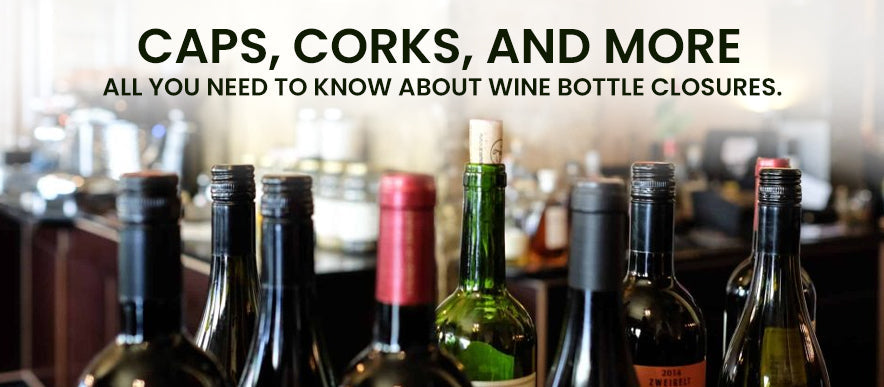History of Wine Bottle Closures
Wine enthusiasts have very often argued over the wine bottle cork as the traditional wine bottle top, the wine bottle top, which is the contemporary wine bottle top, or any other wine bottle top. There are some advantages and disadvantages of each type of wine bottle closing. Whether it promotes good aging or simply provides comfort in easy drinking, the type of closure used can affect the way a wine will mature. The various kinds of bottle closures are important to a person who takes wine seriously regardless of whether he is a collector, an amateur drinker or a business person in the wine industry.

Our blog will discuss the most popular wine bottle stoppers, their history, pros, cons, and their strengths.
The Cork Closures: Tradition and Prestige
Wine Bottle Corks
The oldest and most prestigious type of wine closure is wine bottle cork. Corks are harvested off the bark of cork oak trees in Portugal and Spain and have been used for centuries. They are naturally elastic and porous, which allows small amounts of oxygen to interact with the wine so that it ages gracefully.
Benefits of Cork Closures
Wine bottle stoppers associated with corks are ideal since they offer an airtight and breathable seal. This micro-oxygenation will aid in the maturation of the red wines with the formation of the complex flavors. They also provide the festive pop many people relate to the opening of fine wine and more so, sparkling wines.
Drawbacks of Corks
The largest disadvantage of wine bottle corks is a cork taint (TCA), which can spoil aroma and taste of wine. Also, improperly stored bottles can cause cork to dry up, fall apart or become brittle.
Plastic and bioplastic bottle tops
Synthetic Wine Closures
The synthetic corks are engineered to appear like natural cork in that they are made of polyethylene, which is flexible like natural cork. They are cork taint resistant and can be more affordable to winemakers. Synthetic corks, however, cannot be biodegraded and as such, are less sustainable.
Plant-Based Wine Closures
Alternative plant-based corks, like Nomacorc/PlantCorc, are sustainable, and recyclable. They will keep wine decades without drying up and are therefore an ideal substitute to conventional wine bottle corks.
Alternatives are Limited
Synthetic and plant-based bottle closures are easier to open, but more difficult to reopen and refasten. Alternatives made out of plant-based materials are also generally pricier than ordinary corks or wine bottle lids.
Screw Caps: Competency Meets Commodity
Advantages of Screw Caps
Screw cap wine bottle tops--more often referred to as wine bottle caps--are becoming popular due to convenience. They can be opened, re-sealed easily and they can be used to remove the threat of cork taint. Screw capped wines tend to preserve their freshness.

Under Screw Caps
It is still debatable whether wines under screw caps age like wines under cork. There is an argument that the oxygen-free environment is the key factor to increase lifespan, and some argue it may cause the reduction problem.
Environmental Considerations
Aluminum, not a biodegradable material, is used as the cap on most wine bottles. Screw caps are convenient, but among the wine bottle stoppers they are not the most sustainable.
Less Trendy Closures and Crown Caps
Sparkling Wine Crown Caps
Also used in sparkling wines such as pet-nats, are crown caps commonly used with beer bottles. Such bottle seals are able to resist pressure during fermentation and hence are useful in some methods of winemaking.
Benefits of Crown Caps
They are inexpensive, seal carbonated beverages and provide natural wines with a certain pomp. There are even manufacturers who sell wines under the crown caps without a replacement of corks.

Limitations of Crown Caps
Crown caps are not as prestigious as wine bottle corks and are seldom used in the bottling of fine wines. They better fit relaxed and experimental wines.
Conclusion:-
The wine bottle topper world is varied and enchanting, with conventional wine bottle corks, modern wine bottle tops, and sustainable wine bottle tops, as well as with plant-based tops and wine bottle tops that are made of the same material as the wine bottle. The merits of the closures themselves are these: corks are traditional and aging; screw caps are convenient; synthetics are cheap and crown caps are experimental.
Finally, the decision of bottle closures will rest on the nature of the wine, what the winemaker wants to do, and what the consumer prefers. To the collector, corks still might be king. Casual drinkers may wear screw caps. Anyway, having the knowledge about these choices prompts wine fans to enjoy not only what they put into the glass, but also what puts the wine in the bottle.
FAQs
1. What is so special about wine bottle corks as used by traditional winemakers?
Wine bottle corks are the best thing to age fine wines as they are beneficial in controlled exchange of oxygen.
2. Which is superior in storage; screw caps or wine bottle corks?
Corks are better at long term storage, whilst wine bottle caps perform well in the short- to medium-term storage and can prevent cork taint issues.
3. Are artificial wine bottle corks Earth friendly?
Plastic-made synthetic stoppers cannot be biodegraded, yet wine bottle stoppers made of plant-based materials are environmentally friendly and recyclable.
4. Are crown caps good or bad influences on wine?
Crown caps are great and efficient, particularly in sparkling wines, but they do not have the glory of wine bottle corks.
5. What kind of wine closure is the most sustainable?
Plant-based wine bottle stoppers are the least environmentally damaging yet perform at the same rate as conventional bottle stoppers.

